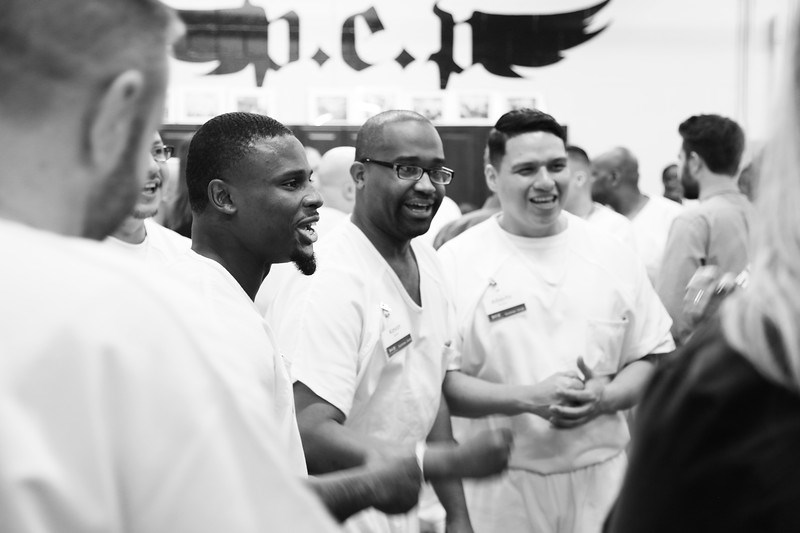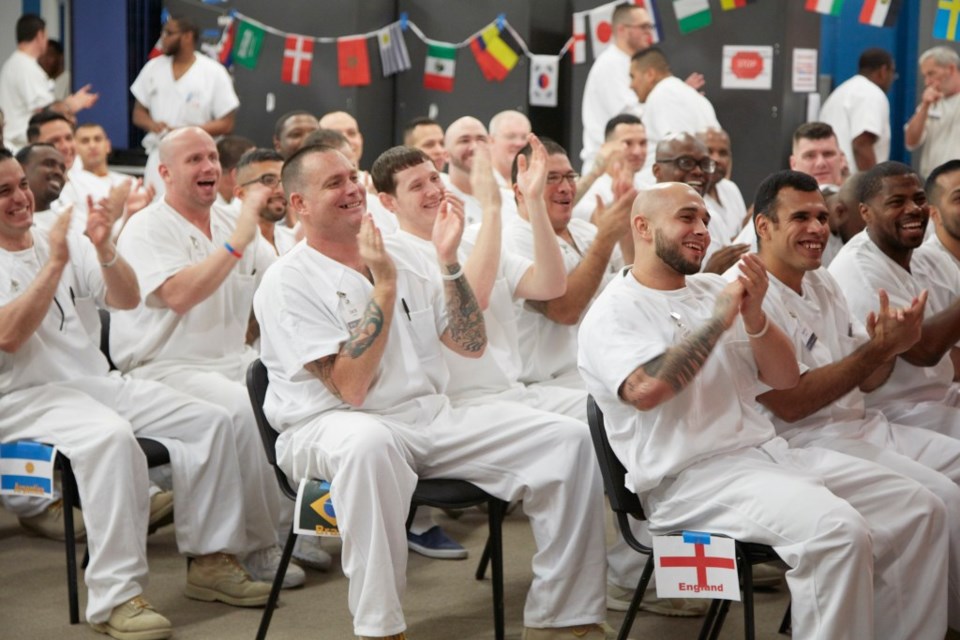The Prison Entrepreneurship Program (PEP) is a Texas prison program is slashing recidivism rates and transforming communities.
The fluorescent lighting inside the Sanders Estes prison unit in Venus, Texas is almost blinding. The hallway is lined by windows into recreational rooms filled with inmates. They press their faces up against the glass, staring as a group of about 70 volunteers, dressed sharply in suits and ties, pass by.
The 2007 hit song “Party Like a Rockstar” blares from a room down the hall where two lines of men, arms outstretched, form a “tunnel of love.” They hold up their hands for high fives and dance to the music as volunteers walk through, smacking hands and offering kind smiles.
There are men of all different races and backgrounds. Some are chubby. Others are lean and muscular. Most are talkative and outgoing, but a few of them seem shy. They all wear standard-issue starch white short-sleeved shirts and white pants that lap around their ankles. On their feet are tennis shoes, Timberland boots or Vans. Their crimes range from drug offenses to assault to murder. But today, they laugh. They seem happy.
For all their differences, these men have one thing in common. They are all part of the Prison Entrepreneurship Program (PEP), a nonprofit and Christian-based organization that aims to transform the lives of inmates through business instruction and camaraderie. PEP recruits business owners, entrepreneurs, MBA students and CEOs of Fortune 500 companies to come in as executive volunteers to mentor inmate participants, teaching them how to form business models and in turn have meaningful lives and careers after serving their time.
The organization’s logo, a large pair of wings with “PEP” centered in the middle, is painted in black on the back wall of the conference room. The logo is symbolic; it is said that the men of PEP live between the wings, because PEP gives them wings to soar. Bennie, one of the PEP Servant Leaders, stands underneath the logo, surveying the room. The Servant Leaders are PEP graduates with time left in their sentences who volunteer with the next class of participants. They serve as DJs and emcees, facilitate events and set up rooms, and most importantly, they serve as mentors to the current class of PEP members.
Bennie, AKA Mr. Uncomfortable, is nervous. Tiny sweat beads form at the top of his forehead. He clasps his hands in front of him. He speaks in a voice so soft it is almost inaudible and at a cadence so fast that it’s difficult to keep up. But he has a warm smile. After being incarcerated for nearly 20 years for aggravated assault with a deadly weapon and retaliation, Bennie is finally scheduled for release. He knows the world outside of the prison walls will be completely different than the one he knew before, but he’s ready to see it. And on the day of his climactic release, Bennie is most excited about taking a bath.
Read more: Plano’s Faces of Hunger: Meet the people who rely on Minnie’s Food Pantry
The program currently operates in four Texas prison units: The Venus Unit just south of Dallas, the Cleveland Unit north of Houston, Woodville’s Gib Lewis Unit in east Texas, and the Lockhart Unit near Austin. The PEP application process is lengthy, with multiple tests and interviews and a handful of stipulations and rules; they only accept prisoners with three or fewer years left in their sentence, and they do not accept sex offenders at all. The organization sends invitations to about 10,000 eligible inmates in Texas twice a year and receives a response from 30 to 40 percent of them. They select about 1,200 inmates who are committed to change. Those inmates are then transferred to one of the four participating units to begin the nine-month program.
As part of their transformation, PEP participants begin with a three-month behavior course to strip them of their tough guy personas and mentally detach them from lives of crime. They are even given nicknames referred to as “sweet names” to replace former gang aliases they might have garnered over the years in the outside world and even during their time in the slammer. Then, they begin the six-month-long business plan program. With help from an average of 70 volunteers at monthly events, these chosen individuals hope to walk out of the prison gates as new people. They’re merely seeking acceptance—from their mothers, fathers, brothers and sisters who don’t invite them to holiday celebrations anymore. From wives and children who no longer trust them. From neighbors who don’t smile or wave back.
Matthew, AKA Sweet Taylor Swift, was incarcerated in 2012 after pleading guilty to injury to a child. He has dreams of starting a tree trimming business once he is released—one that employs people like him who have struggled, particularly young individuals, so that he can help them find their way through life before they find their way to a prison cell.
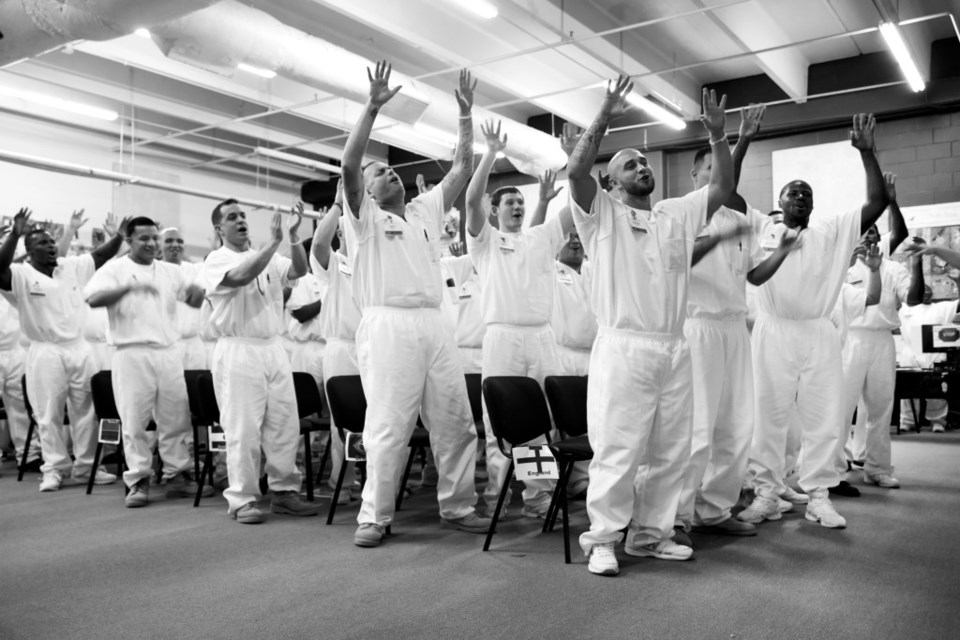
In the Venus Unit, the conference room where most of the PEP events take place is bordered by bright orange and blue cinder block walls. The Think Tank event, one of many business-related sessions, allows inmates to present business ideas to volunteers who give them honest feedback. Rows of chairs are paired off with an inmate sitting in one and an executive volunteer sitting across from them. The inmates have just 10 minutes to explain their ideas and listen to suggestions before they must move on to the next volunteer and present their business plan all over again. The goal is to get as much feedback as possible from a variety of executives who each offer different skill sets and experiences; one volunteer may advise on marketing strategies while another offers financial insight. This comprehensive advice allows the inmates to make changes and perfect their business plans before the next event, all leading up to the final business plan competition that takes place right before PEP graduation.
Bryan Kelley, the new CEO of PEP, knows the organization inside and out; he’s been through the program himself. Bryan never pictured himself holding such a prestigious position, especially considering his past.
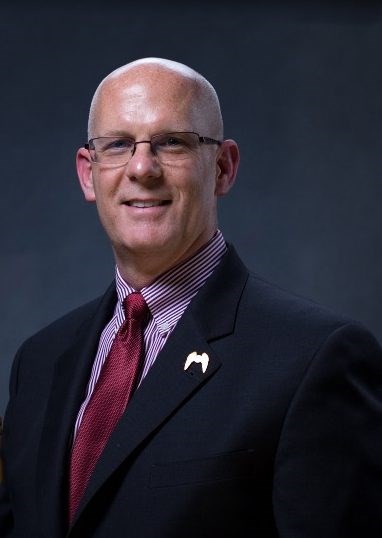
Bryan grew up in small town Ottawa, Kansas. His mother gave birth to him when she was only 18, and his dad left shortly after that. Bryan and his mother struggled financially, moving from house to house when they couldn’t pay rent. Sometimes the power was turned off.
In elementary school, Bryan was short and chubby. Classmates taunted him, hollering “here comes Kelley with the big fat belly” down the hallways. The year he started junior high school, he shot up seven inches. Skinny and strong, Bryan grew into a stellar athlete and became popular among his classmates. He was a member of the student council, a football player and the star of the track team. He even dated the head cheerleader. His future was bright.
Alcoholism was Bryan’s initial downfall. It runs in his family. He began raiding liquor cabinets with his friends at just 13 years old, and drug use followed shortly thereafter. Though his grades and athletic execution plummeted, Bryan managed to secure a Division 2 track scholarship to Pittsburgh State University, where he lasted only one semester due to his party habits and refusal to go to class.
“It was beer and marijuana every single day,” Bryan says. “Wake and bake.”
Seeking a fresh start without a college degree, Bryan moved to Dallas in 1985 at age 22. Managing a barbeque restaurant, he spent the majority of his paychecks on nightclubs, alcohol and drugs. He partied on Greenville Avenue with people who introduced him to cocaine. Soon he was hocking his possessions to afford it. After a few years abusing drugs and alcohol daily, Bryan lost his job and could no longer pay rent; his life was coming apart at the seams. The only thing that kept him going was his girlfriend; she was the light of his life. One night, she asked him to get her some cocaine.
Bryan ended up smoking all the coke that he purchased for his girlfriend, so he called his dealer back and asked for more. He was out of money, but he had a knife and a robbery plan. When the meeting got tense, Bryan panicked. He pulled out his knife and stabbed his dealer four times before fleeing the scene. He quickly moved back to Kansas and went into hiding, but the criminal justice system caught up with him, arresting him on a fugitive warrant and shipping him back to Texas at just 25 years old.
Bryan waited for his trial for nine months behind bars. When it finally came, he maintained his innocence with his mother by his side in a downtown Dallas trial that lasted about a week. In the end, the jury decided that Bryan was guilty of murder, and he was sentenced to 60 years in prison. He was shipped off to the Beto unit in Palestine—the biggest single prison unit in Texas—where he lived with almost 4,000 young and wild inmates.
Bryan remembers the turning point for him. He began to see most of his fellow prisoners as part of the problem, and he wanted to be part of the solution. While incarcerated, Bryan obtained a bachelor’s degree in psychology, completed a 12-step Alcoholics Anonymous program and drug rehabilitation programs, became a college tutor and peer educator, and volunteered at the chapel. In 2007, he was introduced to PEP.
For years, Bryan desperately wanted to join the program, but with too much time left on his sentence—PEP requires that participants have three years or less—he couldn’t. He had gone up for parole more than 12 times and was consistently denied, but once he had served 20 years, his parole was granted. Instead of running out the prison doors, Bryan made an odd request—he wanted to stay just one more year so he could go through the PEP program. He knew the value of the knowledge and relationships PEP would give him.
After graduating from the program in the summer of 2014, Bryan was released from prison with $50 and a bus ticket. He remembers the novelty of seeing cell phones, credit cards, and so many flavors of Doritos at the gas station he and his family stopped at on his way home. He was introduced to Google, email and other technologies. He realized that the world had moved on without him.
“I was incarcerated for more than two decades,” Bryan says. “Twenty-one years, eight months and one day … That’s 7,945 days total.”
Shortly after his release, Bryan was offered a job with PEP; this time, he would be participating from the other side of the bars. He was hired as a transitional coordinator, helping men get back on their feet after their release. Then he was promoted to an executive relations manager where he worked directly with the executive volunteers for the program. In April, he was promoted to CEO of the organization. He says that PEP and God have given him a second chance at life—and he intends to make it count.
Bryan and the rest of the PEP team have big ambitions for the future of the organization. Expansion efforts include a larger presence in Texas and growing to other interested states like Oklahoma, Ohio, Pennsylvania, Indiana and North Carolina. A program geared specifically toward female inmates is also in the works. Ultimately, the organization aims to be the national leader in reentry, giving reformed individuals a second chance.
While PEP teaches business skills and develops character, it ultimately gives participants a new personal identity. Upon release, men who were once only known as convicted felons are now businessmen, entrepreneurs and contributing members of society—labels many of them have never known.
Rick Davidson, AKA Sweet Macauly Culkin, is one of those men. Arrested in July 2009 for conspiracy to commit aggravated robbery, he joined PEP with a mission: to build a business that will keep kids of incarcerated parents off the same track. Having grown up with a father who was in and out of jail, and now with three kids of his own, Davidson’s inspiration was personal.
“I know what it’s like to be a kid left behind and I know what it’s like to be a dad that leaves his kids behind,” Davidson said. “I know the pain on both sides. And I want that cycle to stop.”
100% of PEP graduates secure jobs within 90 days of their release, though most have a job lined up within 20. Many go on to start their own businesses, like print shops, landscaping services and construction companies. Since the program’s inception nearly 15 years ago, PEP graduates have launched more than 350 businesses, with the top six grossing more than one million dollars last year.
Perhaps the most important outcome of PEP is the effect it has on recidivism. According to the National Institute of Justice, the national recidivism rate is 67.8 percent within three years of release, and Texas’ rate is between 24 to 28 percent. PEP’s recidivism rate is just 7.5 percent. This is likely because PEP’s efforts don’t stop at the prison gates; the organization also provides halfway houses, schooling and networking opportunities for program graduates once they are released to help get them back on their feet and stay on the right track.
“I envision the day when there is not such a stigma regarding returning citizens … A day when they are offered a legitimate second chance unencumbered by biases and prejudices,” Bryan says. “I foresee transformed lives, restored families, and rebuilt communities.”
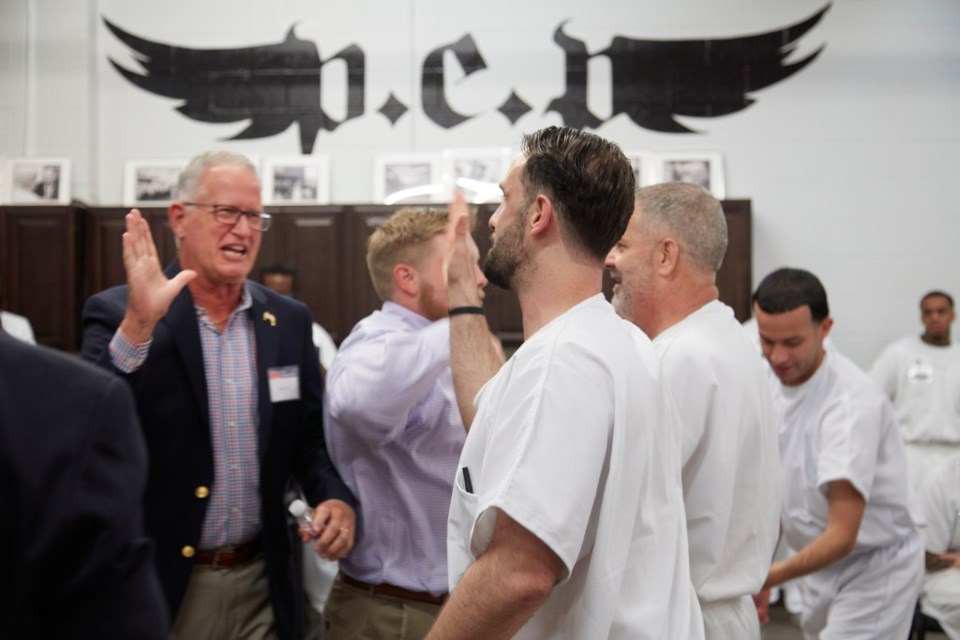
As the PEP Think Tank event comes to an end at the Venus Unit, the men, again sitting on one side of the room with the volunteers sitting on the other, profusely thank the volunteers for their time and guidance. Many cry. One man looks down at his shoes and vulnerably tells he volunteers he would like to be just like them someday. The volunteers cry, too.
Story originally published in our August 2018 edition, The True Crime Issue.

